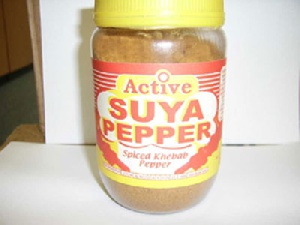..With Excess Levels Of Aflatoxins A spicy powder has been found to be contaminated with excess levels of aflatoxins. The Food Standards Agency (UK) has issued a Food Alert for Action.
Active brand Suya Pepper Spiced Khebab Powder has been found to be contaminated with excess levels of aflatoxins.
Aflatoxins are naturally occurring toxins produced by certain moulds growing on some food crops during production and storage. There are limits on the level of aflatoxins that can be in foods imported into the UK and the rest of the European Union. The maximum permitted limits in certain spices are 5?g/kg for aflatoxin B1 and 10?g/kg for total aflatoxin.
The Spiced Khebab Powder is believed to be sold in large (approximately 250g) and small (approximately 125g) plastic containers with a yellow lid and a red/yellow label. The wording 'Active SUYA PEPPER Spiced Khebab Powder' is boldly written on the label but there is no date marking or batch code. An image of the jar is attached below.
The Suya Pepper Spiced Khebab Powder is distributed in the United Kingdom by Marduro, 46 Hamilton Rd, West Norwood, London SE27 9SB and is manufactured in Ghana.
Despite enquiries by local authorities in London, Marduro has not provided full distribution details, although distribution is believed to be restricted to the London area. This product appears to be distributed through direct van sales, where retailers who sell African or African-Caribbean food products are the main clients.
Local authority enforcement officers have been told that if any of these products are found during routine inspections, they should ensure that they are withdrawn from sale and destroyed.
Occasionally consuming a small amount of aflatoxin-contaminated food is unlikely to cause ill effects. However, aflatoxins have been shown to cause cancer in a number of animal species by damaging DNA. There is also some evidence to suggest they may be harmful to humans. Experts have recommended that aflatoxins in food should be reduced to the lowest levels achievable.
Food alerts Food alerts are the FSA's way of letting local authorities and consumers know about problems associated with food and, in some cases, providing details of specific action to be taken. They are issued under two categories:













